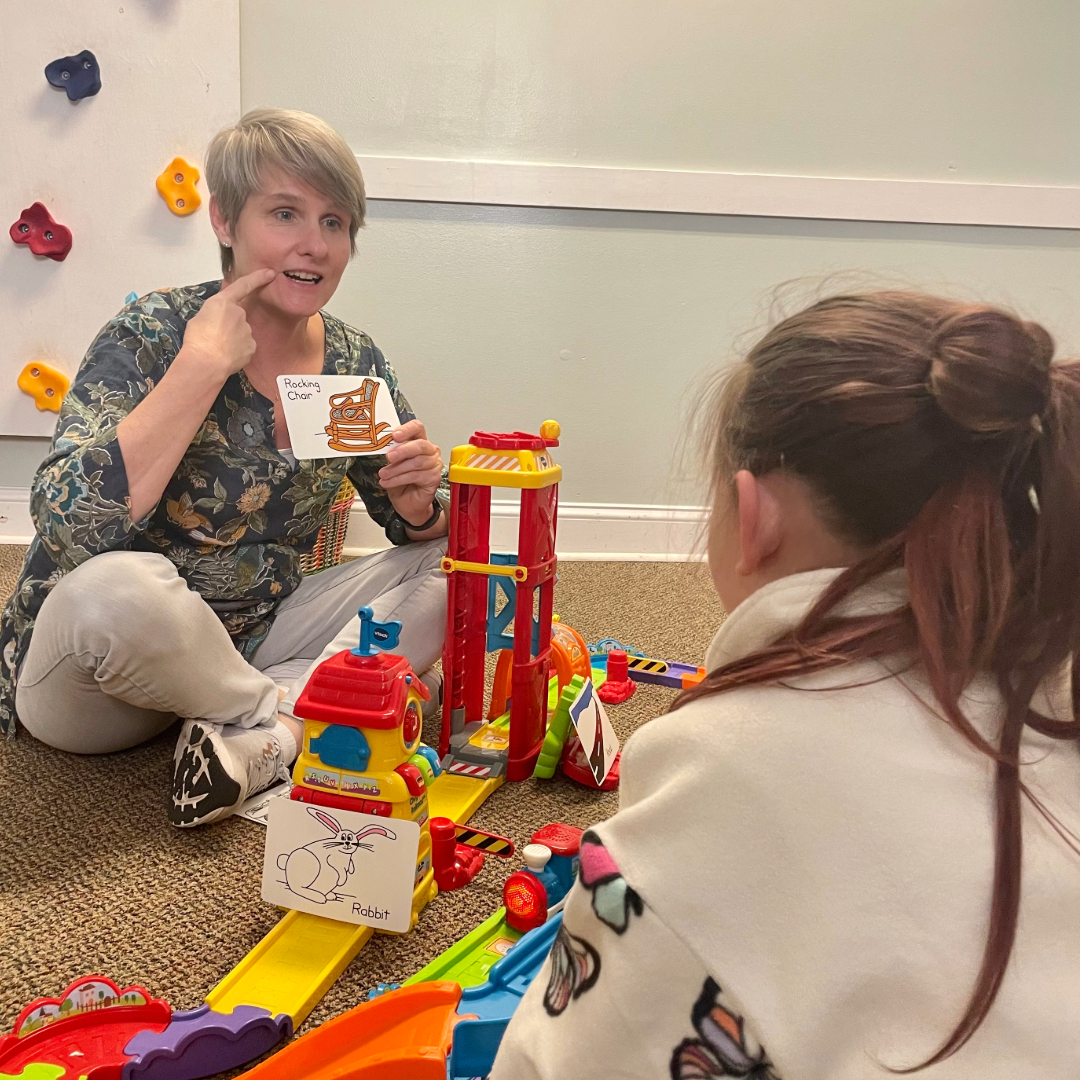OUR SERVICESWe love what we do.
Speech Therapy

Speech therapy helps a child’s communication skills by addressing speech, language, and confidence issues through individualized exercises, promoting effective verbal expression, comprehension, and successful social interaction.
Occupational Therapy

Occupational therapy gives your child a personalized approach to help them develop, regain, or adapt skills needed for daily activities.
Feeding & Lactation Consulting

Feeding difficulties range from infant lactation dysfunction to sensory aversions and medical conditions affecting nutrient intake in older children.

Speech-Language Therapy
A Speech-Language Pathologist will complete a detailed evaluation for receptive and expressive language, social pragmatic language, speech sound production, voice, fluency, feeding, and/or swallowing depending on your specific needs. An individualized plan of care with goals for treatment is developed specifically for your child’s needs. Some of our services include…
 Motor Speech Therapy
Motor Speech Therapy
 IEP/Educational Support
IEP/Educational Support
 Language Therapy
Language Therapy
 Reading Evaluations
Reading Evaluations
 Feeding Therapy
Feeding Therapy
 Voice Therapy
Voice Therapy
 Articulation Therapy
Articulation Therapy
 Swallowing Therapy
Swallowing Therapy
 Behavioral Therapy
Behavioral Therapy
Occupational Therapy
Our pediatric occupational therapists can help your child reach goals and developmental milestones to improve their quality and function for daily living. It focuses on how your child coordinates movements, plays, regulates, attends to, and receives sensory information from the world around them. The skilled intervention and caregiver education provided by within our Occupational Therapy program can Help your child:
 Dressing/Bathing/Eating/ Grooming
Dressing/Bathing/Eating/ Grooming
 Delayed developmental milestones
Delayed developmental milestones
 Playing with toys
Playing with toys
 Self regulation
Self regulation
 Handwriting
Handwriting
 Executive function
Executive function
 Poor hand-eye coordination
Poor hand-eye coordination
 Sensory processing difficulties
Sensory processing difficulties
 Poor attention
Poor attention
 Play & social skills
Play & social skills
 Improve sensory processing abilities
Improve sensory processing abilities
 Develop Age appropriate play skills
Develop Age appropriate play skills
 Improve independence and participation in dressing, bathing, eating, or grooming.
Improve independence and participation in dressing, bathing, eating, or grooming.
 Fine motor and eye hand coordination development
Fine motor and eye hand coordination development
 Visual perceptual abilities
Visual perceptual abilities
 Skills needed for their education (pre-writing, writing and scissor skills).
Skills needed for their education (pre-writing, writing and scissor skills).
![]() Reach motor development milestones
Reach motor development milestones
 Improve ability to regulate within and attend to environment
Improve ability to regulate within and attend to environment
 Develop and learn strategies to improve executive functioning skills.
Develop and learn strategies to improve executive functioning skills.


Feeding Therapy
Feeding challenges can arise due to various factors, such as anatomical issues, sensory sensitivities, or developmental delays. At Dymond we can help children and families with:
 Complementary feeding & the transition to solids
Complementary feeding & the transition to solids
 Increasing food texture acceptance
Increasing food texture acceptance
 Difficulty chewing foods or struggles to control and coordinate moving food around in mouth, preparing to swallow food.
Difficulty chewing foods or struggles to control and coordinate moving food around in mouth, preparing to swallow food.
 Refuses or rarely tries new foods.
Refuses or rarely tries new foods.
 Has difficulty transitioning from gastric tube (G tube) feedings to oral feedings.
Has difficulty transitioning from gastric tube (G tube) feedings to oral feedings.
 Negative mealtime behaviors (crying, arches, pulls away from food, tantrums at mealtimes or “shuts-down” and does not engage in mealtime).
Negative mealtime behaviors (crying, arches, pulls away from food, tantrums at mealtimes or “shuts-down” and does not engage in mealtime).
 The child has prolonged mealtimes, longer than 30 minutes for infants, and 30 to 40 minutes for toddlers or young children.
The child has prolonged mealtimes, longer than 30 minutes for infants, and 30 to 40 minutes for toddlers or young children.
 Transitioning to cup drinking/liquid intake
Transitioning to cup drinking/liquid intake
 Utensil Use
Utensil Use
Our occupational therapists help families create a safe & positive feeding environment, in turn increasing children’s participation in mealtime. We believe in improving physical needs and oral- motor development, introducing multi-sensory exposure of new foods, respecting the child’s eating responses, and diversifying their food choices to encourage a healthy diet.During feeding therapy, our therapists will work with your child to provide them with positive experiences and the skills they need to make meal time more enjoyable and nutritious.
Lactation Therapy
Our lactation informed Occupational therapist at Dymond provides a support system that offers reassurance, education, and practical techniques, reducing stress and enhancing confidence in feeding & lactation practices. Our Certified Lactation Consultants have experience helping infants & families with:
![]() Typical breastfeeding imitation & progression
Typical breastfeeding imitation & progression
 Common breastfeeding problems, such as pain when nursing, oversupply, & lack of supply
Common breastfeeding problems, such as pain when nursing, oversupply, & lack of supply
 Common infant difficulties, such as latching & weight gain
Common infant difficulties, such as latching & weight gain
 Support for complex medical needs
Support for complex medical needs
![]() Support for complex medical needs
Support for complex medical needs
![]() Difficulties starting or progressing with weaning
Difficulties starting or progressing with weaning
 Infant is irritable or lethargic with feedings.
Infant is irritable or lethargic with feedings.
 Baby not ending feedings with feelings of satiation.
Baby not ending feedings with feelings of satiation.

Frequently Asked
Questions
Get the Answers
Common concerns include:
Refusing food or liquid
Failure to accept different food textures
Coughing or gagging during meals
Difficulty chewing
Excessive drooling while feeding
Gurgling, hoarse, or breathy voice during feeding
Frequent spitting or vomiting
Recurring pneumonia or respiratory infections
Less than normal weight gain or growth
Sensory processing difficulties
Delayed developmental milestones
Through evidence-based practice, OTs are able to provide a holistic approach to breastfeeding through a unique perspective as developmental specialist with significant training in anatomy, physiology, and sensory processing. Through this whole-body approach, OTs can educate and empower parents while supporting infants with & without developmental disorders in the natural progression of feeding by addressing internal and external factors, such as positioning, state regulation, oral motor skills, and more.
Speech-language pathologists are trained in the mechanisms of the swallow, oral motor development, and the management of dysphagia. SLP’s play a critical role in the management of feeding for those with complex medical needs while assisting parents in chairing their goals. SLP’s provide support to parents and infants by addressing pre-feeding skills, the physiology of the swallow, and how these factors may impact their ability to safely and adequately consume an age-appropriate diet.


